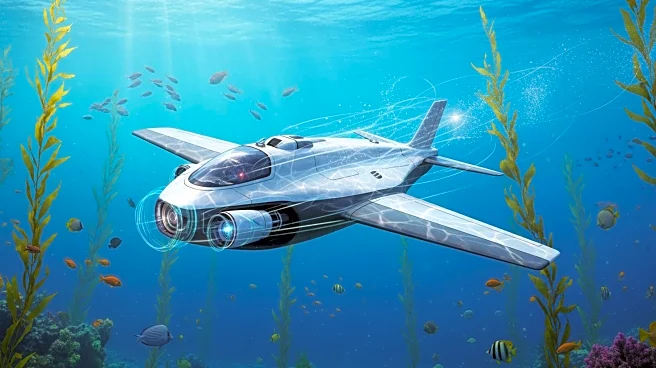What's Happening?
ALSEAMAR, a French company specializing in underwater gliders, has been awarded a contract by Ifremer to design and develop a new deep-sea glider capable of reaching depths of up to 3,500 meters. This initiative is part of the France 2030 investment plan,
funded by the French National Research Agency, aimed at strengthening France's capabilities in deep-ocean exploration and observation. The project involves collaboration with CNRS and Shom, and a scientific user group will help define the sensors to be integrated into the glider. The new glider will join the existing fleet of underwater vehicles used by the French scientific community, supporting research on ocean circulation, climate change impacts, and seismic and volcanic activity. Initial field demonstrations are planned in the Mediterranean Sea, followed by deployments off the coast of Mayotte to study underwater hazards and geological risks associated with the Fani Maoré submarine volcano.
Why It's Important?
The development of a deep-sea glider capable of reaching 3,500 meters is significant for advancing scientific knowledge in oceanography. It addresses the marine science community's need for deeper exploration tools, which are crucial for understanding global scientific and societal challenges. The data collected by these gliders will enhance research on climate change impacts, ocean circulation, and seismic activities, providing valuable insights into environmental and geological phenomena. This project also supports the emergence of a competitive national industrial sector in underwater technologies, positioning France as a leader in deep-sea exploration capabilities.
What's Next?
Following the design phase, the new glider will undergo initial field demonstrations in the Mediterranean Sea to observe variations in deep water properties and assess climate change impacts. Subsequent deployments off Mayotte will focus on studying geological and seismic risks linked to the Fani Maoré submarine volcano. These efforts will complement existing data collected by ALSEAMAR's SEAEXPLORER gliders, enhancing the understanding of underwater hazards. The successful deployment and operation of the new glider will validate its use as a tool for deep-ocean exploration and monitoring, potentially leading to further advancements in ocean research technologies.
Beyond the Headlines
The development of this deep-sea glider highlights the technological challenges and innovations required to explore the deep ocean. It underscores the importance of international collaboration in scientific research and the role of government investment in advancing technological capabilities. The project also raises ethical considerations regarding the exploration and conservation of deep-sea ecosystems, emphasizing the need for responsible research practices to protect vulnerable marine environments.
















